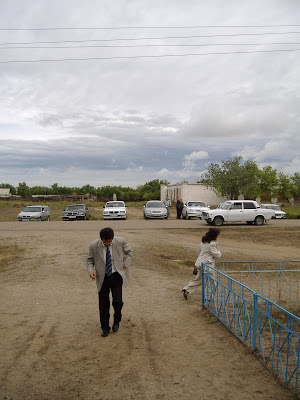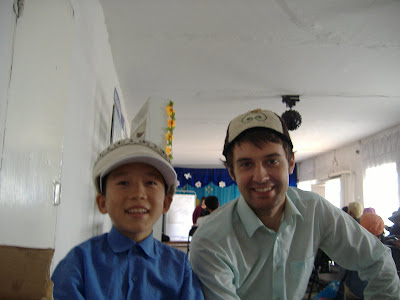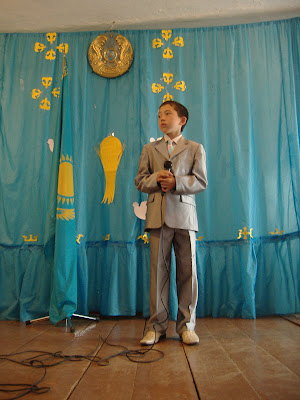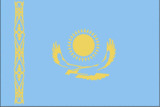A few weeks back, I had the supreme fortune of being asked to be a camp counselor and teacher at "Camp Far Away Places", a summer camp for children from the rival villages of Bayanaul and Maikaiyeen. The campers, numbering around 50 or so, were broken into five different group countries: the intelligent India, the elegant Egypt, the joyous Japan, the awkward Canada and the saucy Spain (adjective added by me). My group campers came together to form the country of Spain, and I enjoyed nearly every minute of getting to know and educate them and other campers. Each day, a different country was selected to be focused upon and learned about. Campers were presented lessons in language, culture, history, art and biography. That's the skinny.
The fat gristle is that so much fun was had and so many laughs were shared and so many children were hit with dodge balls that I could not think of a more condensed period of "work" enjoyment during the rest of my service in Kazakhstan to this point.
I must, just to balance out this lovefest, make it clear that my lesson on Canadian history was weak and boring. The topic I chose to present upon makes it clear enough: "Canada: The Quiet Revolution."
The camp took place on a small resort with a sizeable dirt area for running and gathering. The kids would gather every morning to be led in morning exercises, and then--sometimes orderly, sometimes not--collect in front of the cafeteria, form a line and shout their team cheer. My team's--Spain's--cheer went as such:
"Spain brings the pain! Spain brings the pain! Spain brings the pain! (clap, clap, clap, clap, clap, clap) Ole!"
Each night we played a review game to make sure the kids paid attention in addition to a special evening activity. The first night, we played something called "The Big Game." This was an event where myself and two other volunteers wore capes and face paint, and placed flour in socks with which we would then swing and hit them as the kids shuttled between the review game stations. Don't worry, folks, it's safe.

Maybe, I'm no safety inspector #34. But they had fun!
There were disco clubs, and with most disco clubs, as we all know, come hordes of females that want to dance with me. I can't help it really, it's just a curse being so approachably attractive. The Peace Corps interview never really covers the subject of how one would deal with the noticeable disappointment on a 13-year old girl's face when you tell her that yes, you do have a girlfriend already.
Okay, I don't really feel like relaying all the details of the camp; I suggest that you check out this and this website for a thorough rundown of it all, as told by my fellow volunteers. What I wish to convey is the feeling that I had at the very end of the camp. A few of the volunteers had to catch a bus back to the city of Pavlodar, and in order to do so, had to leave a littler earlier than all the campers. We volunteers climbed onto the bus to bring us to the bus station (Kazakhstan is a bus culture), but within a minute's time, the whole thing was surrounded by the kids. After countless waves and goodbyes, one of the kids came onto the bus. A hug rung out. Then another. Then another. Before I know it, there are children crowding the door to come in and gives us all tearful hugs and broken sentences of gratitude.
"This never forget me ever," said one of my Team Spain students.
The boys, showing greater emotional restraint but still showing something, would place their hands on the windows, waiting for the opposite pane to be struck in a high five, prison visitation sort of way. In an all too Hallmark conclusion, the bus then pulled us away from the group of sobbing kids, us all waving and mouthing thank yous until the last turn ended it.
Now these types of instances are built over a long period of time. It was the work of volunteers from a few years ago, establishing the relationships with local schools and teachers so that they may trust an outsider to want to hold a camp with diverse lessons and teaching methods. It was the work of volunteers each year that had to scramble for the vast majority of the year to find financing for everything from space rental to wiffle balls. Mary Couri and Adam Henricksen, a Kaz-19 and Kaz-18 respectively, were up to the task this year and did an amazing job. They worked hard and it showed. It was so, so good.
The actual ride back home to Pavlodar was not so pleasant, as there were multiple delays, no tickets left and the whole trip, which usually takes roughly three hours, took about eight. The following photo sums up just about any Peace Corps volunteer's experience with taxi drivers. In this photo, Scott (a fellow volunteer that only speaks Kazakh) is trying to talk to the taxi driver. The taxi driver suggests a price of roughly $100. I notice this as a problem, so start talking to him in Russian. I get him down to $70, but that's still crazy. In the end, we got a much better deal with a much better driver, but the game of "Who's Gonna Talk and in what Language?" is always fun.
 Bartering.
Bartering. Met a Phillies fan during the long wait. After explaining to him how cool I though his hat was, we became friends. Then, he whispered to me that he had a headache, which in real-life Russian translates to "I have a massive hangover and need to drink beer posthaste, so could you be nice and give me 100 tenge?"
Met a Phillies fan during the long wait. After explaining to him how cool I though his hat was, we became friends. Then, he whispered to me that he had a headache, which in real-life Russian translates to "I have a massive hangover and need to drink beer posthaste, so could you be nice and give me 100 tenge?"This, as I calmly put it, is balance.
HARVEST

My friends, I want to talk to you about the potato.
The potato is a tuberous vegetable crop that can provide someone with fine daily values of vitamins C, potassium, riboflavin, zinc, phosphorous, iron, folate, magnessium and thiamin. Despite common belief, these nutrients are not concentrated in the potatoe's skin, as at least 50 percent of all dietary goodness can be found in the potato itself. They can also protect you against colon cancer and improve glucose tolerance! Damn, knowledge is awesome.
If you take a look back a few entries, you can find some information on what the Russian call, "dachas." Every few weeks or so, I spend some time at my director's parents' garden home, planting and tending various vegetables and fruits. The most consuming task was planting roughly 400 potatoes, way back in June. Each time we would work there, we would have to clear weeds or cut back the frothing potato bushes that would come up. It was an annoying task, and all for potatoes.
But to force a theme here, much of work in this instance and in countless others is about working toward the harvest, the realization of our efforts.
And there just aren't many situations that are so clear cut as 1) dig a hole 2) plant a potato 3) tend potato 4) eat potato. Over the course of the past two years, I have planted illustrative potatoes in a variety of places, whether it was trying to teach my co-workers how to create a student volunteer group or writing to numerous book donation agencies or editing scholarship applications or teaching a kid how to dribble a basketball properly or introducing the concept of microcredit to old women. I haven't eaten many of these potatoes. I don't know if they're growing. I don't even know if they will be of any use or success. I don't know.
At my office with the HIV/AIDS group, we have written multiple proposals for project financing and experience exchange trips. Recently, we inquired about an international AIDS conference to take place in Amsterdam. My counterpart, the lovely Dina Galyeva, was rejected right off the bat. My director, Elena Bondareva, was put on the waiting list as the heading company searched for further funding to pay for her trip there. They assurred us that the funding would come through, and the excitement from Elena was damaging to my ears (she is an expressive, loud woman). Unfortunately, we recently received word that she would not be going.
That potato died.
Another time was when I started a youth sports club. At our first meeting, over forty kids came to learn how to play basketball. After two meetings, less kids showed up, and the tendency for each game to degenerate into a call for soccer grew. After two months, I had only three reliable kids showing up*.
That potato died.
The Pavlodar Public Library is supposed to receive shipments of books from the International Book Project soon. My director is soon going to begin working as the National Coordinator for the AIDS International Candlelight Memorial project for two years. Youth volunteers come to our weekly meetings with regularity and vigor in order to help with planning and implementation of HIV/AIDS projects.
Those potatoes are still in the ground.
Last Sunday, after digging up those 400 actual potatoes at the garden home, the sight of them spread out on the ground made me so damn happy. Such a smile for such a starch.
So whenever I have the chance to see some sort of result--good or bad--I am genuinely thankful for that moment.
But most humbly, as I approach the end of my service here, I know there are many things in the ground that I will never dig up and eat.
















































